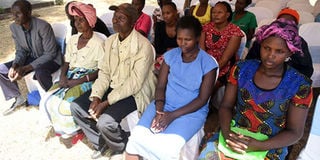Detention of patients, bodies illegal

Some of the 258 patients who were released from Kenyatta National Hospital on April 2, 2019 after being detained over arrears. Detaining patients is a violation of their human rights. PHOTO | FILE | NATION MEDIA GROUP
What you need to know:
- The Constitution protects every person’s right to dignity, to protection from cruel, inhuman and degrading treatment and to liberty.
- The universal health coverage programme must ensure that the most vulnerable of citizens can access quality healthcare without being crippled by financial hardship.
Detention of patients for inability to pay their hospital bills is rampant in Kenya.
In 2017, the media reported that a policewoman whose twins died after birth was detained by a Nairobi hospital for failure to foot her Sh3 million bill.
Also that year, six women from Bungoma were reportedly detained by a hospital in Lugulu for more than three months because they couldn’t raise maternity fees.
The following year, a private hospital located in the suburbs of Nairobi was accused of detaining 12 patients, among them a young man who was scheduled to sit his Kenya Certificate of Secondary Education (KCSE) examination, for non-payment of their bills.
Alarmingly, such detention of patients has gained social acceptance: Most Kenyans mobilise funds from family, friends and other well-wishers to secure the release of their kin instead of challenging the illegal detention by the hospital.
HUMAN RIGHTS
But the detention is unconstitutional. The Constitution protects every person’s right to dignity, to protection from cruel, inhuman and degrading treatment and to liberty.
The right to dignity means one must be valued and treated with respect.
The right to be protected from cruel, inhuman and degrading treatment places a responsibility on the government to ensure that no one is treated in a manner that causes them mental, emotional or physical pain or in a manner that humiliates them.
The right to liberty means one should not be arbitrarily deprived of their freedom.
Last Thursday, the National Assembly’s Committee on Health turned its attention to detention of patients by hospitals.
The committee summoned Health Principal Secretary Susan Mochache to answer questions submitted by Mathare MP Anthony Tom Oluoch on the subject.
CRUELTY
Among the issues Mr Oluoch sought responses to was the number of patients being detained by hospitals in the country.
In her response, the PS informed the committee that the ministry had sought the information from more than 3,000 facilities in Kenya.
At the time of her appearance, 200 facilities had responded to the request, indicating that they were detaining 300 patients.
Kenyatta National Hospital has so far released 258 patients who were detained; however, this does not mean the practice has stopped.
When hospitals detain patients for inability to pay their bills, they act unconstitutionally and violate human rights. They reduce the detained person to a form of collateral for the debt.
Detention outside legally recognised processes is cruel and the victims have often decried mistreatment and neglect by hospital staff.
In some of the cases that courts have decided, formerly detained petitioners highlighted incidents of being compelled to sleep next to leaking toilets or denied food. All this happens in hospitals that do not have a legal mandate to deprive persons of their liberty.
BROKEN SYSTEM
Moreover, every person has a constitutional right to freedom and security, which includes the right not to be detained without trial.
Health institutions must, therefore, not exercise punitive measures as could constitute a crime.
And such detention is a symptom of a broken-down health system. Over-commercialisation of healthcare, coupled with inadequate regulation, has created an environment that emboldens hospitals to set exorbitant prices for health services and act unconstitutionally in an attempt at recovering monies owed to them.
Hospitals, of course, have a legitimate expectation to be paid for providing services. But their efforts to recover costs owed to them must reflect a respect for and deference to the Constitution and the rule of law.
The discussion on payment of hospital bills cannot, therefore, be had outside this context.
HEALTH JUSTICE
It is commendable that the National Assembly has taken the initial steps towards banning detention of patients by hospitals and ensuring accountability for the affected people.
The next step is to engage in a national conversation around financing and regulation of the health sector to eliminate arbitrary pricing, thereby addressing one of the root causes of the detentions.
Additionally, the universal health coverage programme must ensure that the most vulnerable of citizens can access quality healthcare without being crippled by financial hardship but that hospitals receive payment for their services.
These most difficult of issues require concerted efforts from all parties — national and county governments, the Ministry of Health, hospitals and the public — to ensure that Kenyans receive the highest quality healthcare in dignity.
The journey towards the new Constitution was long and hard fought; we must deliberately and intentionally inculcate a culture of respect for and adherence to it. Our nation cannot settle for less.
Ms Minayo is a capacity building manager and Ms Odallo is an advocacy adviser at the Center for Reproductive Rights. [email protected]





